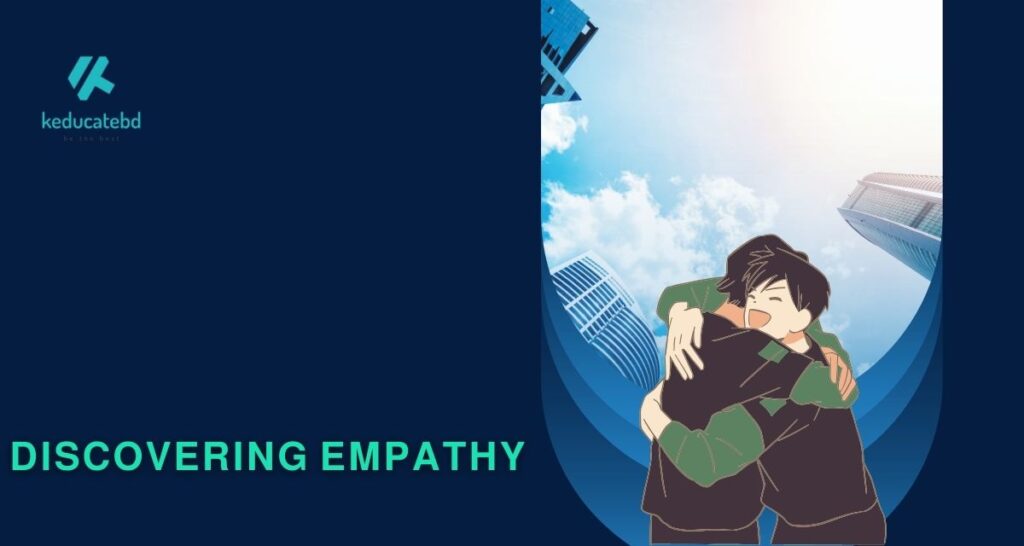Introduction
Empathy, a cornerstone of human interaction, is the capacity to understand and share the feelings of another. It is more than mere sympathy, which is feeling compassion or sorrow for someone else’s misfortune. Empathy goes deeper, allowing us to step into another person’s shoes and experience their emotions as if they were our own. This quality fosters connection, understanding, and compassion, creating a foundation for meaningful and supportive relationships.
The Nature of Empathy
At its core, empathy involves both cognitive and emotional components. Cognitive empathy, also known as perspective-taking, is the ability to understand another person’s mental state or point of view. Emotional empathy, or affective empathy, is the capacity to share another person’s feelings. Together, these aspects of empathy enable us to respond to others in a compassionate and supportive manner.
Philosophically, empathy is often linked to the concept of moral imagination—the ability to envision oneself in the place of another and understand their experiences and emotions. This imaginative process is crucial for ethical decision-making and moral behavior. It allows us to transcend our own perspectives and consider the needs and feelings of others.
The Power of Empathy
Empathy has profound implications for both individuals and society. On a personal level, empathy enhances our relationships, making them more fulfilling and resilient. It allows us to connect with others on a deeper level, fostering trust, understanding, and mutual support. Empathetic individuals are better equipped to navigate social interactions, resolve conflicts, and provide emotional support.
On a societal level, empathy is essential for building a compassionate and inclusive community. It encourages us to look beyond our differences and recognize our shared humanity. Empathy can bridge divides, reduce prejudice, and promote social justice. It motivates us to take action to alleviate the suffering of others, whether through charitable work, advocacy, or simple acts of kindness
Philosophical Perspectives on Empathy

Empathy has been a subject of philosophical inquiry for centuries. David Hume, an 18th-century philosopher, argued that empathy, or what he called “sympathy,” is the foundation of moral sentiments. According to Hume, our ability to feel for others is what gives rise to moral judgments and motivates ethical behavior.

Contemporary philosopher Martha Nussbaum also emphasizes the importance of empathy in her work on emotions and ethics. Nussbaum argues that empathy is crucial for developing an ethical society, as it enables us to understand and respond to the needs and experiences of others. She suggests that empathy should be cultivated through education and social practices to foster a more compassionate and just world.
The Transformative Power of Empathy
Empathy is a profound and transformative quality that enriches our lives and strengthens our communities. It allows us to connect with others on a deep emotional level, fostering understanding, compassion, and mutual support. By cultivating empathy, we can create a more compassionate and inclusive society, one where everyone feels seen, heard, and valued.

The Power of Empathy: A Story That Heals Hearts
Once upon a time, in a bustling city filled with the sounds of life and the hustle and bustle of daily routines, there lived a young boy named Alex. Alex was known for his curiosity and intelligence, always eager to learn new things. However, he was often so absorbed in his own world that he rarely noticed the struggles of those around him.
Alex lived in a modest apartment with his single mother, Sarah. Sarah worked long hours as a nurse, tirelessly caring for her patients. Despite her demanding job, she always made time for Alex, nurturing his love for reading and encouraging his inquisitive nature. Sarah often spoke to Alex about the importance of understanding and caring for others, but Alex, preoccupied with his studies and hobbies, didn’t fully grasp her words.
One winter, the city was hit by a severe snowstorm. The streets were covered in a thick blanket of snow, and the cold was biting. Schools were closed, and people were advised to stay indoors. Sarah, however, had to work at the hospital, where the needs of the patients took precedence over the weather.
One evening, as Sarah was about to leave for her night shift, she turned to Alex and said, “I know it’s cold and snowy, but remember to look out for others, especially those who might need help.”
Alex nodded absentmindedly, more interested in his book than in his mother’s words. After Sarah left, he settled into his usual routine, reading and playing video games.
As the night grew colder, Alex heard a strange noise outside. Curious, he went to the window and saw an old man struggling to push a cart full of firewood through the snow. The man’s face was etched with exhaustion, and he looked like he might collapse at any moment.
For a moment, Alex considered returning to his book, but then his mother’s words echoed in his mind. He put on his coat, hat, and gloves, and stepped out into the frigid night. The cold air bit at his cheeks as he made his way to the old man.
“Sir, do you need some help?” Alex asked, his breath visible in the icy air.
The old man looked up, surprise and relief in his eyes. “Yes, please. I’m trying to get this firewood to my home, but the snow is making it very difficult.”
Without hesitation, Alex grabbed the handle of the cart and began to push alongside the old man. The journey was tough, the snow deep and unyielding, but together they managed to get the cart to the man’s small house on the outskirts of the neighborhood.
Once inside, the old man offered Alex a cup of hot cocoa as a thank you. As they sat by the fire, the man, whose name was Mr. Thompson, shared stories of his youth and the many winters he had endured. Alex listened intently, feeling a warmth in his heart that had nothing to do with the fire.
That night, as Alex walked home, he felt a sense of fulfillment he had never experienced before. He realized that his small act of kindness had made a significant difference in Mr. Thompson’s life. He also understood, for the first time, the true meaning of his mother’s words about empathy and caring for others.
The next day, Alex couldn’t stop thinking about how he could continue to help those around him. He decided to start a neighborhood support group with his friends, helping elderly neighbors with their groceries, shoveling snow from driveways, and checking in on those who lived alone.
Word of their efforts spread, and soon other children and even adults joined in. The neighborhood became a close-knit community, where everyone looked out for one another. The acts of empathy and kindness transformed not only the neighborhood but also Alex himself. He became more aware of the struggles others faced and more committed to making a positive impact.
Years passed, and Alex grew up to become a social worker, dedicating his life to helping those in need. He often shared the story of that snowy night with young people, encouraging them to cultivate empathy and take action to support their communities.
Conclusion
Empathy is a powerful force that can transform individuals and communities. Alex’s story illustrates how a simple act of understanding and helping another person can lead to profound changes. By stepping outside of our own experiences and seeking to understand the feelings and struggles of others, we can create a more compassionate and connected world.
Let us all strive to cultivate empathy in our daily lives. Let us listen more, understand more, and care more. In doing so, we not only enrich our own lives but also contribute to the well-being and happiness of those around us. Empathy is not just a quality; it is a way of being, a commitment to seeing and valuing the humanity in everyone we encounter.


